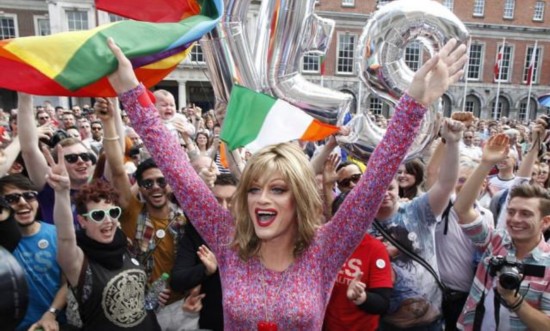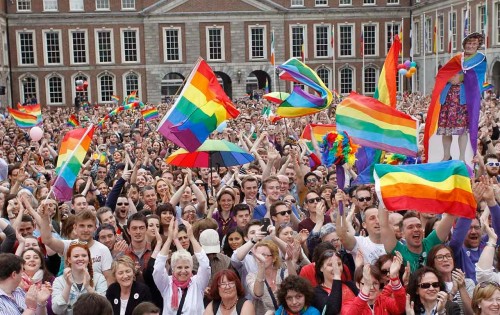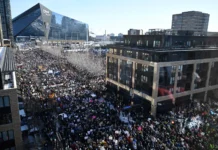Growing opposition to conservative establishment
Conor Payne, Socialist Party (CWI in Ireland)
The Yes vote to the Marriage Equality referendum on 22 May represented a huge vote in support of equality for LGBTQ people and in support of progress and social change. The streets of Dublin and other cities were packed with people celebrating a victory which was the culmination of decades of struggle by LGBTQ people.
This Facebook post from LGBT activist Panti Bliss captures the change and the feeling of release that the result has realized, : “Walking through Dublin city centre yesterday, two days after the result, it was remarkable and lovely to see so many LGBT couples casually holding hands. Long may it continue. All changed, changed utterly.”
The scale and breadth of the Yes vote was impressive, demonstrating decisively the change in attitudes which has taken place in Irish society over the past decades. This is a country where homosexuality was criminalised until 1993! Yes defeated No 62.1%-37.9% with a turnout of 60.5%, the highest turnout for a referendum since the Divorce referendum in 1995. By contrast, in 2008 the US state of California Marriage Equality was defeated in a popular vote by 52%-48%. Whereas in the past, referendums on issues such as divorce and abortion had close run results, with a major divide between Dublin and the rest of the country, only one constiuency voted No, with even rural constituencies which would be viewed as traditionally conservative delivering often strong Yes votes. The vote was strongest however among young people, women and in working class areas.
This could not have been achieved without the development of a politicisation and a movement among all these groups, with young people in particular mobilising to achieve a huge Yes vote. 66,000 mostly young people joined the supplementary electoral register to vote in the referendum, with multiples of that registering in the months leading up to the referendum. In Fingal, 4,207 people put their names on the register. On the day an incredible 96% of these new voters actually turned out and voted. The #HomeToVote hashtag captured the phenomenon of scores of mainly young emigrants- many forced out by the economic crisis – with up to 50,000 returning to Ireland to vote Yes.
Hundreds of people got active in canvassing and other campaigning work in the run up to the referendum. In Dublin and across the country ‘Yes’ badges were ubiquitous as tens of thousands consciously made a statement. Huge numbers of people will have been involved in advocating for a Yes vote among their friends and family. This was a social movement – the second major movement to sweep Ireland in the past year, along with the water charges struggle.
Huge working class Yes vote
During the referendum, the ‘No’ campaign attempted to paint the referendum as the project of a ‘liberal elite’. At the same time ‘Equality Minister’, Labour’s Aodhan O’Riordain, reflecting a view of working class people as unsophisticated and backward, expressed worry that voters angry about water charges would vote No, saying: “I think when those bills start arriving, and then campaigners come to their doors, well I think people might tell us where to go, tell us ‘Give me a referendum on water first and I’ll vote on that.’ The level of antagonism that has been whipped up about politics in general could lead to people voting against a very genuine proposition to do with equality and human rights”.
Despite these stereotypings of working class people, the highest Yes votes in the country were recorded in the most deprived and neglected working class areas. As reported in the Irish Times for example, in Dublin Coolock voted 88% Yes, Jobstown 87%, th Liberties 88%, Cherry Orchard 90%. In Limerick, Moyross voted 70% Yes and South Hill 72%. The very people mobilised and politicised by the anti-water charge movement went on to register a powerful statement in support of LGBT friends, family and neighbours and for equality and social change. Grainne Healy, chairperson of Marriage Equality and co-director of the main “Yes Equality” campaign herself explained that “When we were out canvassing in areas like Finglas, there was an overwhelming Yes. Once we moved into Glasnevin, there would be more resistance. It seemed the houses with two cars and plenty of money were just less open to Yes.”(Irish Times 24/05/15)
The introduction of marriage equality will bring real benefit to same-sex couples in Ireland who want to marry. But the vote was about more than that. Despite some rhetoric from the ‘Yes’ campaigners about marriage being the ‘foundation of a stable society’, the vote was first and foremost an affirmation of the equality of LGBTQ people. It also represented a rejection of the bigotry and backward vision of society of the No side. The vote showed a huge aspiration for an equal, progressive and secular society.
During the campaign, the No side attempted to sow doubts and fears, particularly around LGBT people raising children and around issues like surrogacy. The argument that children ‘have a right to a married mother and a father’ was in reality completely out of tune with and insulting to the many families in Ireland which now exist outside this supposed ‘ideal’. They also made play of taking on the mantle of victims who were being ‘silenced’, and painting themselves as going up against the establishment. But these arguments were not able to gain traction with anything like a majority. The reality is, far from being ‘silenced’ or demonised, the No side were treated with kid gloves by the majority of the establishment starting from the decision of RTE to hand out €80,000 to members of the Iona Institute after they were called ‘homophobes’.
The intervention of the Catholic church hierarchy, who were prominent on the issue, was also spurned. The comments of Kevin Doran, the Bishop of Elphin that gay people who had children were ‘not parents’ were emblematic of the attitude of the ‘No’ side. On the Sunday before the referendum, pastoral letters from the bishops calling for a ‘No’ vote were read out at masses around the country. There were some reports from around the country of such statements provoking walkout among massgoers. The comments of Archbishop Diarmuid Martin after the vote that the church ‘needed a reality check’ and had ‘completely drifted away from young people’ reflect the deep crisis of the church steeply declining authority.
The scale of the victory for Marriage Equality in the referendum demolishes the myth of an innately conservative ‘silent majority’ and points to the forces who are the real agents of change and progress in Irish society. It demonstrates conclusively that the source of the conservative nature of the Irish state is to be found in the establishment, not the attitudes of the majority of people. It also intimates that a Yes campaign with a less cautious message could have resulted in an even higher Yes majority. We received huge positive feedback on the Anti Austerity Alliance (AAA) posters and many commented that its slogan “Discrimination Damages Lives” was the most heart-wrenching and impactful poster of the Yes campaign. The AAA was also the only political force that made reference to LGBT culture with the use of the rainbow flag on its posters, contrasting hugely with Labour’s “Let’s treat everyone equally” slogan with images of people that seemed to depict no-one who was in an LGBTQ relationship.
Leo Varadkar, Minister for Health described the vote as a ‘social revolution’. This reflects the major change which has taken place, but is also an attempt to suggest that equality is now achieved and issues largely resolved. In fact, the vote showed a hunger for change and the political energy unleashed by the campaign will not go away. We now have in Ireland an incredibly contradictory situation where a LGBT teacher working in a church run school, can get married but would then face the threat of losing their jobs for violating the church’s ‘ethos’. There is a still a discriminatory ban in place against gay and bisexual men donating blood. The government is pursuing a Gender Recognition Bill which is highly flawed and is ignoring the concerns of the transgender community. These can all emerge as important campaigning issues. More fundamentally, there is a desire to challenge the conservative nature of the Irish state. We are not simply on a smooth path to ever increasing progress and tolerance. Those who oppose change maintain huge power in society.
The Catholic Church, despite its teachings on ‘moral issues’ being increasingly rejected, maintains huge power through its control of most primary and secondary schools in the state, its status as the largest private landowner etc and can use this position to block social change. We see this in ‘Section 37’ of the Employment Equality Act which allows religious run insititution such as schools and hospitals discriminate against people in employment based on their sexuality. We see it in their continued hold over the curriculum and ‘ethos’ of schools which means that most LGBT young people do not receive inclusive education, including sex education, which recognises and validates their lives. The demand for a secular society and the separation of church and state will now emerge as key issues. In an effort to aid the building of this continued struggle, Anti Austerity Alliance TDs have submitted a Bill to the Dail to scrap ‘Section 37’.
Most sharply of all, the referendum poses the question of the repeal of the 8th amendment and the disgraceful lack of abortion rights in Ireland. One poll show 56% in favour of the repeal of the 8th amendment, with only 19% against. For decades, the political establishment has sat on its hands, despite scandals such as Savita Halapannavar, Ms. Y, and fatal foetal abnormalities. The excuse was always that people were ‘not ready’ and a referendum could not be won. That argument is redundant. The result shows clearly that the problem is with establishment not the voters, and a referendum campaign could be won. Labour are now attempting to link themselves to these issues, suggesting that they will push for a referendum to repeal the 8th if they are part of the next government. But these election promises ring hollow in the context of the fact that Labour, along with Fine Gael, Fianna Fail and Sinn Fein, have voted down multiple bills for repeal of the 8th amendment and even more limited forms of abortion rights in the lifetime of this Dail. The fact that Labour and Sinn Fein have now adopted the call to repeal the 8th amendment, is a result of pressure from a pro-choice movement and changes in public attitude and that pressure must be maintained to win a referendum. What has been shown by the campaign is that change comes from below, and now massive pressure must be put on all parties, but particlarly those who have come out for repeal, to hold a referendum and allow for abortion rights in Ireland.
The scale of the victory for Marriage Equality in the referendum should give huge confidence to all campaigners for social and economic equality. It also points to the strategy which is needed to achieve social change. Maintaining active mobilisation and pressure was key to this victory, but also cuts against the grain of capitalist politics in Ireland. Speaking on the day of the count Eamon Gilmore noted the active involvement of young people in the campaign and said: ‘“Democracy is not a passive activity. ” This is absolutely correct, but it is the opposite of what we’ve heard over the last year from a government which has demonised political activity by working class people outside of ‘official politics’ as ‘fascist’ and ‘sinister’.
A Conservative Establishment
The fact that all the parties called for a Yes vote could be taken the indicate that the establishment has changed and is now accepting or even driving progress on social issues. The reality of the situation was exposed by the crisis in Fianna Fail, who have been shown up as having significant opposition to marriage equality within their ranks, and a reluctance to push the issue. Fianna Fail, Fine Gael, Labour and Sinn Fein have all voted against even extremely limited abortion rights in the last year. All parties remain opposed to abortion rights, advocating at best the right to an abortion in extremely limited circumstances such as fatal foetal abnormalities and in cases of rape and incest.
The question of equality was key to this camaign but we still live in a society which is deeply unequal in many ways, socially and eocnomically. From the continued discrimination in law against LGBT people and women, to the scandal of direct provision, to the rise in wealth inequality in Ireland and internationally. In all of this, capitalism in Ireland is deeply implicated. Capitalism bases itself on inequality, and fosters divisions between people in order to justify and maintain its rule. In Ireland, the weak capitalist establishment which is incapable of taking society forward has used and become linked to the ideology of the catholic church to justify its rule. Homophobia remains powerfully ingrained in society, not just in the laws or the churches but in the reality of homophobic attitudes and assumptions as experienced by LGBT people every day. This cannot be challenged by a capitalist system wedded to inequality and conservatism.
We need a movement which challenges all oppression and inequality, and bases itself on solidarity of working class people, women, LGBTQ people and migrants. We need a socialist society based on equality and solidarity where wealth and power is removed from the hands of a privileged few and where the basis for bigotry and oppression is fundamentally uprooted.





